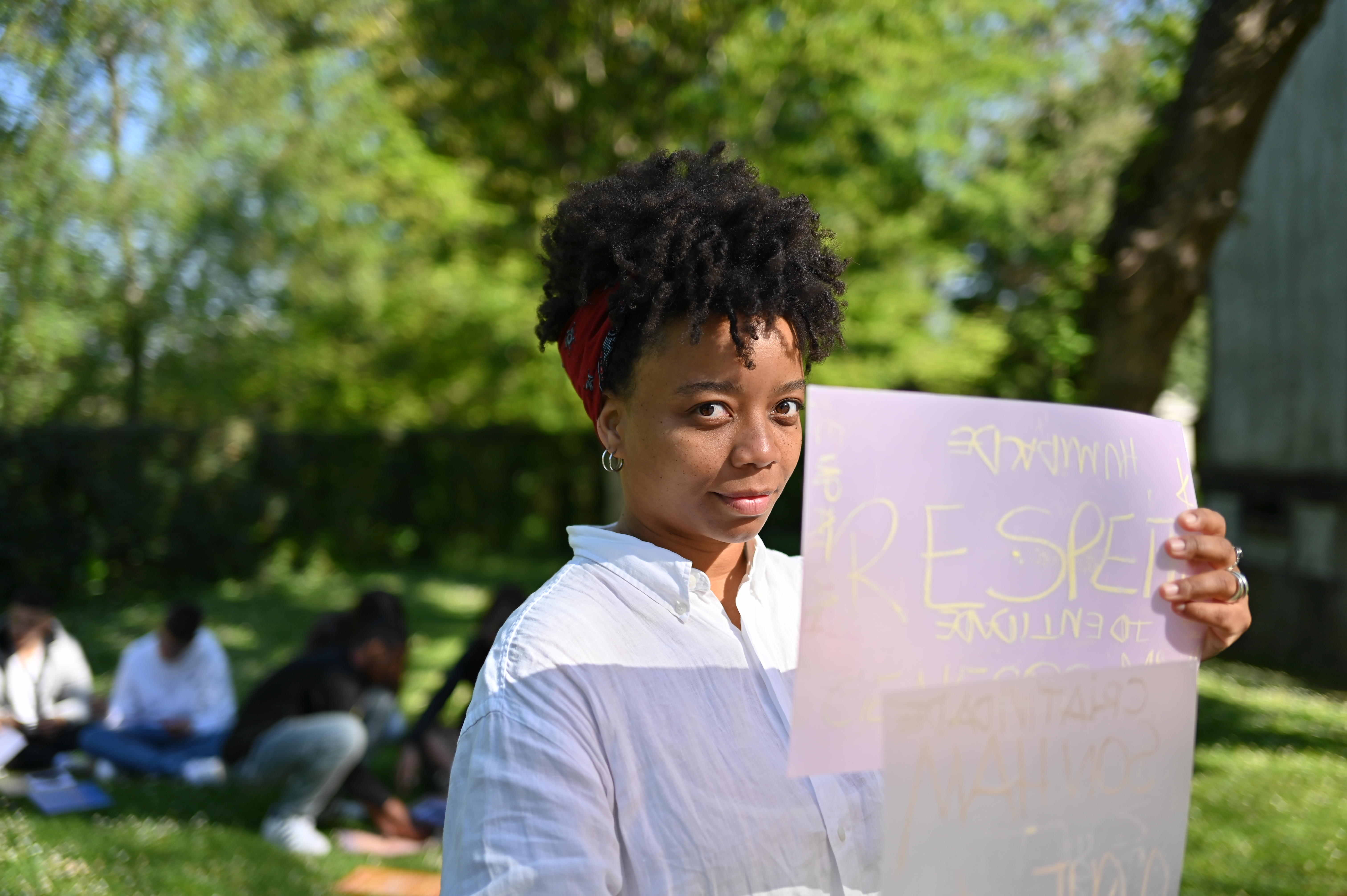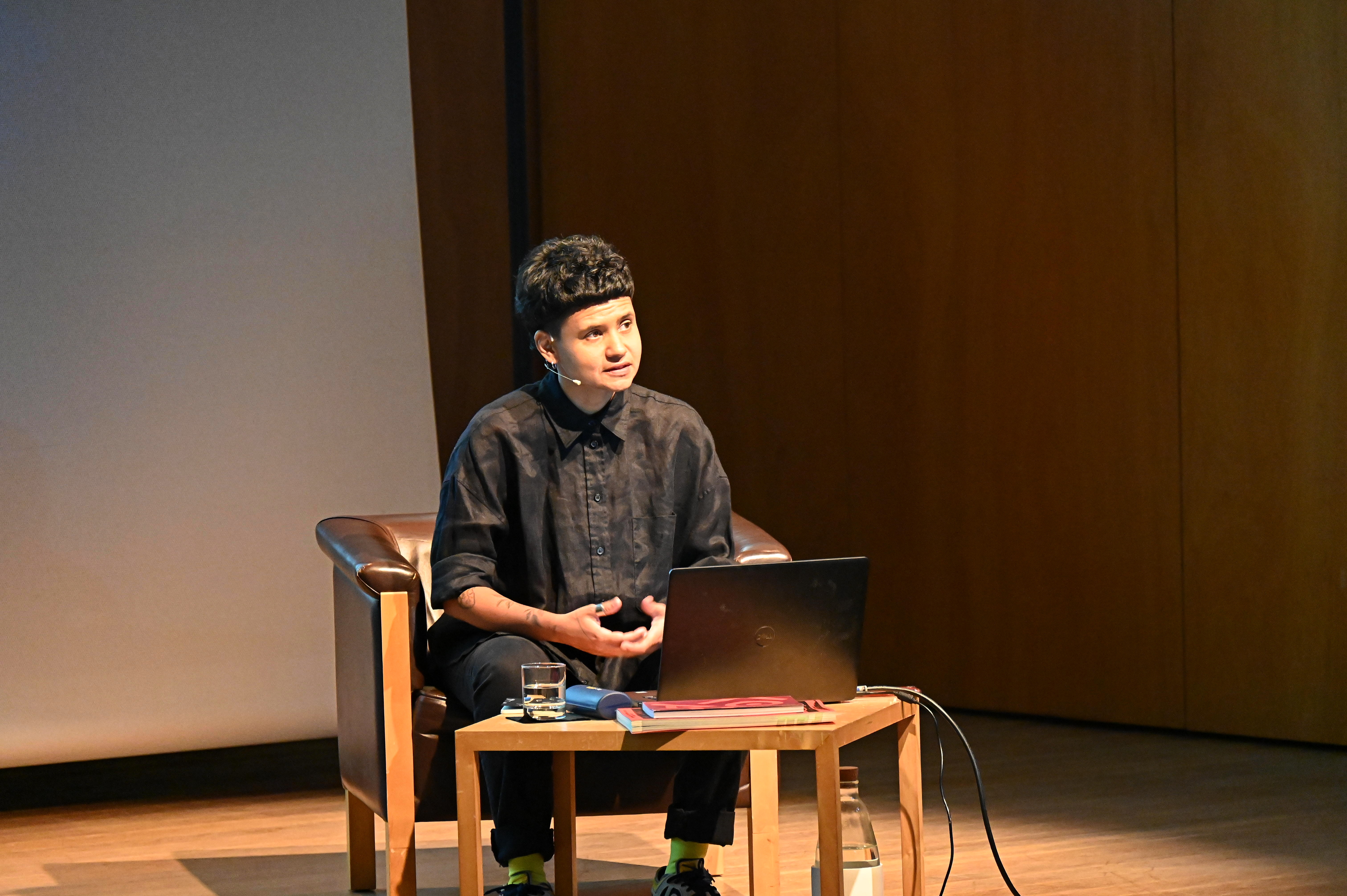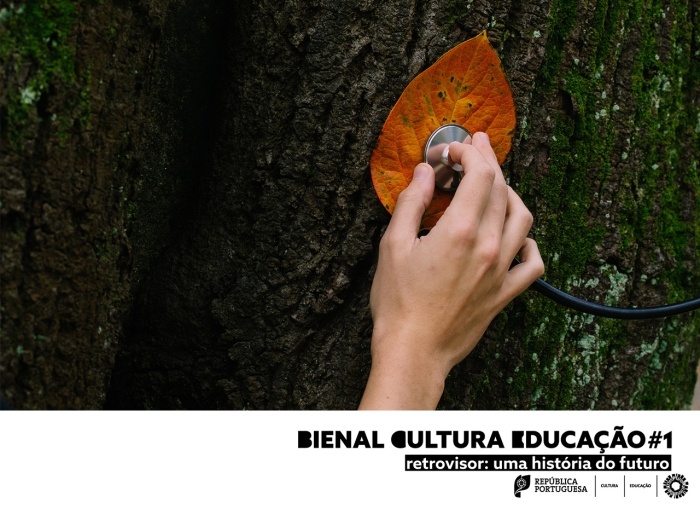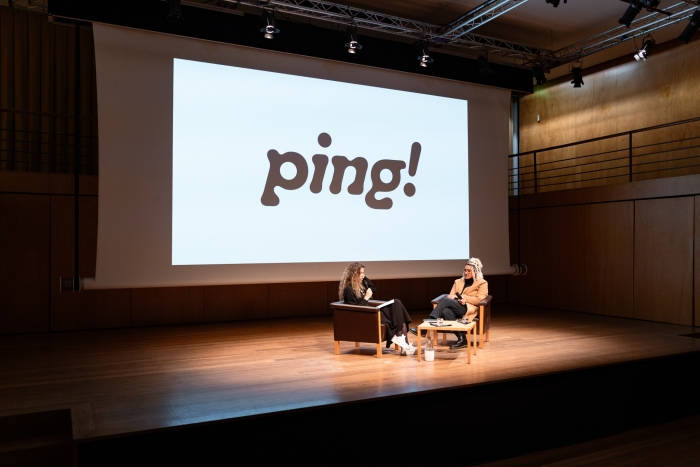Memória de Elefante 2023
The First Portuguese Colonial Exhibition took place in 1934 in the gardens of the Palácio de Cristal. Its ex-libris was a large sculpture of an elephant, displayed on the roof of the Palácio de Cristal, which at the time was called the Palácio das Colónias. Honouring the elephant as a symbol and a real animal with a great capacity to retain and transmit knowledge, Memória de Elefante revisits the material culture, archives and colonial reminiscences associated with the city of Porto through workshops, tours and talks with artists, activists and educators with the aim of discussing the implications and legacy of colonialism.


PING! / schools / april 17, 18, 19
Workshop Filters for Image Transgression, with Thais de Menezes
Filters for Image Transgression was a workshop that started from a decolonial action as well as from the deconstruction of three places: the Infante D. Henrique High School, the Crystal Palace with its Gardens and the First Portuguese Colonial Exhibition, which have in common their temporal and ideological conception.
By bringing together students and teachers in three encounters, Thais de Menezes intended to potentiate collective experiences, both in the classroom and in her atelier, in an attempt to transgress teaching and its learning methods. The portrait in painting and photography, its descriptions, and also digital images with the use of filters or masks, was approached and rehearsed, generating new representations.
Based on these artistic practices and on the archive of the 1934 colonial exhibition, the (re)creation of ways of observing oneself and the other was proposed. The development of a collective installation will allow new "observation filters" to take into consideration the places of speech and of listening, but also the different ways of life, cultures and knowledge.
In the context of this workshop, there was also a lecture by Beatriz Lemos, curator at MAM - Museu de Arte Moderna do Rio de Janeiro, who, based on the developed project, brought her vision and experience in curatorial practices and anti-racist mediation.


Thursday, May 25th, at 7pm
Talk: Sewing between times: notes on curatorship, education and collections
From a curatorial practice that connects art, learning processes and memory, curator Beatriz Lemos joins PING!, to share the most recent exhibition projects, public programmes and publications carried out by the Curatorial, Education, Communication and Collection departments of MAM - Museum of Modern Art of Rio de Janeiro, in Brazil.
The conversation takes place within the workshop Filters for Image Transgression, guided by Thais de Menezes, which started from a decolonial action and the deconstruction of three places: the Infante D. Henrique Secondary School, the Palácio de Cristal, with its gardens, and the First Portuguese Colonial Exhibition, which have in common their temporal and ideological conception.

Walks trough the gardens
Trees are not, after all, the only witnesses
In 1934, Porto was the chosen venue for the First Portuguese Colonial Exhibition. The Palácio de Cristal received a new façade, in a more modern style and was temporarily named Palácio das Colónias (Colonial Palace). In the 19th century gardens, an idea of the Portuguese empire was staged, through the recreation of "Indian villages", where women, men and children were exhibited and exoticised to legitimise a campaign to attract new settlers.
Few traces seem to be left by this exhibition in the gardens, but it is precisely this idea of false invisibility that led PING! to reflect on the impact of this colonial exaltation in the city. Trees are not, after all, the only witnesses is the title of a programme of walks through the gardens that will use visual records, souvenirs from the period and the legacy that remains in the urban public space to revisit and debate this colonial exhibition.
Each walk will be led by Claire Sivier and Marta Lança who, in their artistic and research practices, have been stimulating the debate and opening it to a post-colonial perspective. At the end of each activity, there will be space and time for a collective conversation.
Few traces seem to be left by this exhibition in the gardens, but it is precisely this idea of false invisibility that led PING! to reflect on the impact of this colonial exaltation in the city. Trees are not, after all, the only witnesses is the title of a programme of walks through the gardens that will use visual records, souvenirs from the period and the legacy that remains in the urban public space to revisit and debate this colonial exhibition.
Each walk will be led by Claire Sivier and Marta Lança who, in their artistic and research practices, have been stimulating the debate and opening it to a post-colonial perspective. At the end of each activity, there will be space and time for a collective conversation.


PING! / 3 (4pm)
Walk through the gardens with Marta Lança: The Africa that comes: from Humiliation to Afrotopia
If colonialism instrumentalized knowledge and ignorance to colonize territories and minds, this pretension was later replaced by "development" policies (progress, reason, growth and order). From a place where a worldview of hierarchical order was staged par excellence and where Africans were humiliatingly objectified (at the First Portuguese Colonial Exposition, 1934), let's look for what Africa has been teaching us every day and for many centuries.
Subverting the logic of racial inferiority, which sustained the European fallacy and program of "civilizing" the other (as the one who should absorb the values of a supposed European civilization), and in the antithesis of the one and indivisible national and imperial sovereignty of Portuguese colonialism, we will make a journey through communitarian, utopian, lived and imagined meanings, with Afrotopia (2016) by the Senegalese thinker Felwine Saar, on the horizon.


Saturday, October 28 at 4pm
Walk through the gardens with Claire Sivier
We invite you to visit the gardens of Palácio through the perspective of British-Jamaican artist and researcher Claire Sivier, along with local collaborators.
Following the 1934 First Portuguese Colonial Exhibition, what lingers within the garden nearly 90s years on? What hidden remitments remain and perhaps mirror current societal perspectives? And how does this connect to the wider narratives of diasporic colonial histories? How can these considerations probe us to reframe our understanding of these narratives in the present moment? This interactive tour will encourage participants to reflect on these questions, bring together their personal perspectives, consider their relationship to the space, and what actions that might want to take forward into the future.


Thursday, November 30 at 7pm
Terra – Conference with Gabriela de Matos and Paulo Tavares
This year marks the 18th edition of the Venice Architecture Biennale with the central theme being Laboratory of the Future. In this talk, Gabriela de Matos and Paulo Tavares - curators of the Brazil Pavilion - will share what it was like to think of Brazil as Terra [Earth], in the exhibition that won the Golden Lion.
In their own words, they explain that earth is "soil, fertiliser, ground and territory. But it is also earth in its global and cosmic sense, as a planet and the common home of all life, human and non-human. Earth as memory, and also as future, looking at the past and heritage to broaden the field of architecture in the face of the most pressing contemporary urban, territorial and environmental issues."
The conversation will be moderated by Andreia Garcia, curator of Portugal's official representation at the Venice Biennale, and will also aim to showcase other projects that Gabriela and Paulo are developing independently in Brazil.


Thursday, December 14, at 7pm
Zoos humanos, ethnic freaks y exhibiciones etnológicas – Conference with Hasan G. López Sanz
This conference will address some of the issues that Spanish philosopher Hasan G. López Sanz has been investigating, such as the complex relationships between exoticism and education, anthropology and colonial memory, restitution and reparation.
The presentation will also consider how contemporary art has materialised these ideas, particularly through the work of artists who have deconstructed the colonial thinking that often persists in some of the human sciences and academia.
"Zoos humanos, ethnic freaks y exhibiciones etnológicas. Una aproximación desde la antropología, la estética y la creación artística contemporánea", published by Hasan Lópes in 2017, was also one of the many references for building the core knowledge of the "Memória de Elefante" axis of Ping! The book, published by the Concreta publishing house, deals with important topics for reflection and debate on these matters, such as the Estado Novo's decision to organise the "First Portuguese Colonial Exhibition" in Porto's Palácio de Cristal Gardens in 1934.
